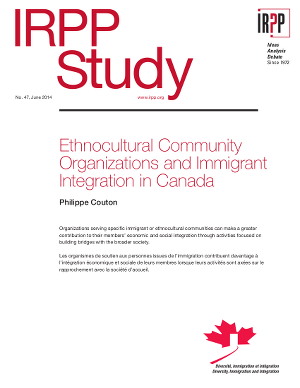In Canada, as elsewhere, many immigrants rely on ethnospecific organizations — those that represent and provide services to a single ethnocultural group — to further their economic and social interests. This can have varying consequences for group members. Although dense communal organizing often facilitates economic networking and provides various other supports to recent arrivals, it can also lead to low incomes, social isolation and delayed integration.
This study explores organizational capacity within the Korean-Canadian and Ukrainian-Canadian communities by analyzing the number and types of organizations and the collective resources available to their members. It presents some of the most detailed quantitative data available, drawn from Canada Revenue Agency administrative files on charitable organizations, combined with other evidence.
The study demonstrates that although both communities are notable for the density of their organizational sectors and their extensive mobilization activities, there are important differences between them. The Korean-Canadian community is formed mainly of people who have arrived in the past few decades, more than 60 percent of whom completed post-secondary education. The author demonstrates that collective organizing within this community is closely linked to immigrant entrepreneurship (largely in small businesses) — a “defensive” approach that partly reflects the difficulties many Korean-Canadians face finding work within their fields of education and/or previous employment. The author suggests that this approach may be distancing Korean-Canadians from mainstream economic and social life.
The Ukrainian-Canadian example illustrates the significant long-term benefits associated with strong organizations that, since the community took root in the late 19th century (notably on the Prairies), have combined protection of community concerns with an outward-looking orientation. Ukrainian-Canadians have experienced significant upward economic and social mobility and have strong cultural and political representation at all levels. More recently, Ukrainian-Canadian organizations have supported a new wave of immigrants who have arrived following the dissolution of the Soviet Union.
As for policy implications, the author raises concerns about governments’ apparent reluctance to support ethnospecific organizations — reflected, for example, in reduced federal government funding for the immigrant settlement services these organizations provide. He calls on governments to develop or expand programs to assist business development, including by promoting collaboration with business associations in other immigrant-background communities. He concludes by stressing the need to recognize the role ethnospecific organizations can play in immigrants’ economic and social integration and participation — a potential that can be more fully realized through the activities of organizations that focus, at least in part, on building bridges with the broader community.
Read more
Download the report
Table of Contents
Summary
Résumé
Models for Understanding Immigrant Integration
Methodology
Korean Networking and Entrepreneurship in Canada
The Ukrainian-Canadian Experience
Implications and Conclusions
Notes
References
About This Study





